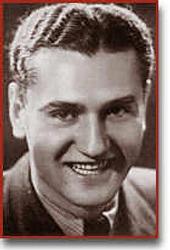Rudi Schuricke was born on March 16, 1913 as Erhard Rudolf Hans Schuricke in Brandenburg an der Havel. For job reasons (his father was Militärkapellmeister) the Schuricke family moved to Konigsberg, and it was there that Rudi Schuricke went to school. He studied to become a druggist but he also worked as a newspaper salesman and Chauffeur. In addition, he studied singing and took theatrical instruction.
He first came to a singing engagement by accident. During a live radio broadcast, in which a singer of the group Kardosch-Sänger (his singing teacher Istvan Kardosch’s group) failed to show up. Schuricke substituted and his soft tenor fit so well with the others that he remained in the group.
In 1931 he got an offer to sing with the Comedian Harmonists. However, since the 18-year-old Schuricke had already created his own singing group (the Spree Revellers) he turned it down. In 1936, with partners Karl Golgowsky and Horst Rosenberg, he formed the Schuricke Terzett. They performed current hits in a more modern style, and the group reached its highest popularity with the citizens of Berlin. In addition to performing with this group, Schuricke sang solo with numerous orchestras and also now and then he also lent his singing voice to other actors in revue films.
Schuricke finally had his greatest success in 1943 with the Tango song 'Capri-Fischer' written by Gerhard Winkler. With other titles such as 'O mia bella Napoli', 'Frauen und Wein', 'Frühling in Sorrent', 'Florentinische Nächte' and 'Tarantella' (which he himself composed), Schuricke was able to make the hit parades many times over, as so many longed for the South, Sand and Sea. These were only some of many sentimental songs designed to please the then Italy-loving Germans.
With the rise of rock music and the disappearance of shellac 78’s, Rudolf Schuricke also gradually disappeared from the hit stage. For a time, he worked as a Hotelier and operated a laundromat in Munich. His was able to launch a successful comeback in 1970 with a James load melody 'So eine Liebe gibt es einmal nur’. Unfortuantely, he did not enjoy his refound popularity for long. Schuricke died in Munich on December 28, 1973 at the age of 60, and is buried at the cemetery in Herrsching am Ammersee.
